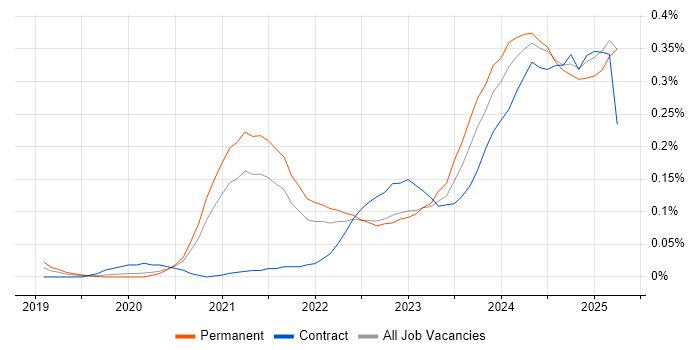Microsoft Power Platform Developer
England > Midlands
The median Microsoft Power Platform Developer salary in the Midlands is £54,344 per year, according to job vacancies posted during the 6 months leading to 3 May 2025.
The table below provides salary benchmarking and summary statistics, comparing them to the same period in the previous two years.
| 6 months to 3 May 2025 |
Same period 2024 | Same period 2023 | |
|---|---|---|---|
| Rank | 230 | 268 | 319 |
| Rank change year-on-year | +38 | +51 | +27 |
| Permanent jobs requiring a Power Platform Developer | 21 | 50 | 8 |
| As % of all permanent jobs advertised in the Midlands | 0.30% | 0.43% | 0.084% |
| As % of the Job Titles category | 0.33% | 0.45% | 0.094% |
| Number of salaries quoted | 20 | 40 | 8 |
| 10th Percentile | £51,250 | £48,750 | - |
| 25th Percentile | £52,500 | £57,813 | £50,500 |
| Median annual salary (50th Percentile) | £54,344 | £62,500 | £55,750 |
| Median % change year-on-year | -13.05% | +12.11% | +71.54% |
| 75th Percentile | £57,500 | £66,250 | £62,188 |
| 90th Percentile | £57,875 | £95,000 | £72,500 |
| England median annual salary | £55,000 | £62,500 | £65,000 |
| % change year-on-year | -12.00% | -3.85% | +44.44% |
All Permanent IT Job Vacancies
Midlands
For comparison with the information above, the following table provides summary statistics for all permanent IT job vacancies in the Midlands. Most job vacancies include a discernible job title that can be normalized. As such, the figures in the second row provide an indication of the number of permanent jobs in our overall sample.
| Permanent vacancies in the Midlands with a recognized job title | 6,422 | 11,026 | 8,538 |
| % of permanent jobs with a recognized job title | 91.73% | 94.31% | 89.43% |
| Number of salaries quoted | 2,856 | 8,249 | 4,756 |
| 10th Percentile | £27,500 | £26,250 | £29,000 |
| 25th Percentile | £34,000 | £33,750 | £37,500 |
| Median annual salary (50th Percentile) | £50,000 | £47,500 | £52,500 |
| Median % change year-on-year | +5.26% | -9.52% | +5.00% |
| 75th Percentile | £63,750 | £60,741 | £67,500 |
| 90th Percentile | £75,000 | £75,000 | £77,500 |
| England median annual salary | £57,500 | £53,500 | £60,800 |
| % change year-on-year | +7.48% | -12.01% | +1.33% |
Power Platform Developer
Job Vacancy Trend in the Midlands
Job postings that featured Power Platform Developer in the job title as a proportion of all IT jobs advertised in the Midlands.

Power Platform Developer
Salary Trend in the Midlands
3-month moving average salary quoted in jobs citing Power Platform Developer in the Midlands.
Power Platform Developer
Salary Histogram in the Midlands
Salary distribution for jobs citing Power Platform Developer in the Midlands over the 6 months to 3 May 2025.
Power Platform Developer
Job Locations in the Midlands
The table below looks at the demand and provides a guide to the median salaries quoted in IT jobs citing Power Platform Developer within the Midlands region over the 6 months to 3 May 2025. The 'Rank Change' column provides an indication of the change in demand within each location based on the same 6 month period last year.
| Location | Rank Change on Same Period Last Year |
Matching Permanent IT Job Ads |
Median Salary Past 6 Months |
Median Salary % Change on Same Period Last Year |
Live Jobs |
|---|---|---|---|---|---|
| West Midlands | +21 | 14 | £53,688 | -14.10% | 3 |
| East Midlands | +50 | 7 | £55,000 | +4.76% | 3 |
| Power Platform Developer England |
|||||
Power Platform Developer Skill Set
Top 30 Co-occurring Skills and Capabilities in the Midlands
For the 6 months to 3 May 2025, Power Platform Developer job roles required the following skills and capabilities in order of popularity. The figures indicate the absolute number co-occurrences and as a proportion of all permanent job ads across the Midlands region featuring Power Platform Developer in the job title.
|
|
Power Platform Developer Skill Set
Co-occurring Skills and Capabilities in the Midlands by Category
The follow tables expand on the table above by listing co-occurrences grouped by category. The same employment type, locality and period is covered with up to 20 co-occurrences shown in each of the following categories:
